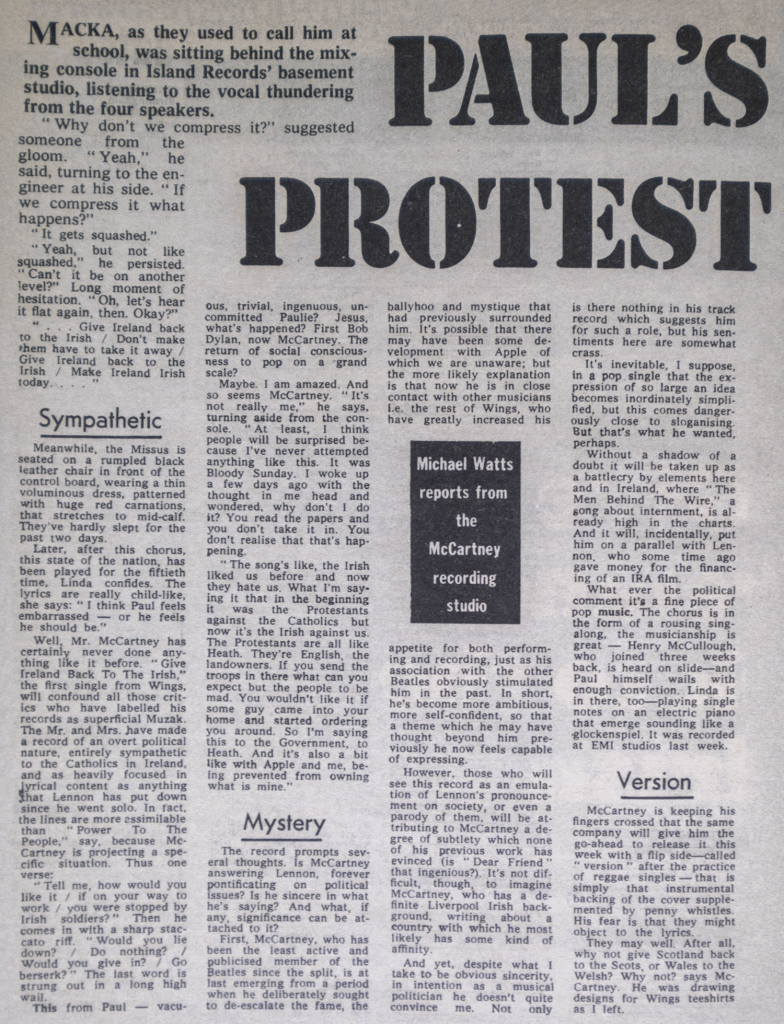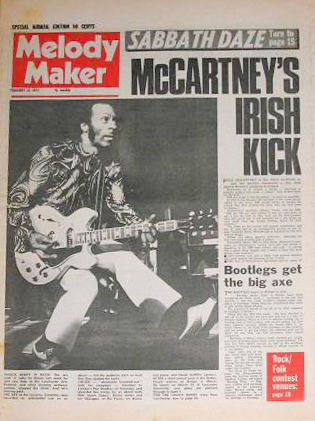Saturday, February 12, 1972
Interview for Melody Maker
Paul's Protest
Press interview • Interview of Paul McCartney
Last updated on April 22, 2022
Saturday, February 12, 1972
Press interview • Interview of Paul McCartney
Last updated on April 22, 2022
Article Feb 12, 1972 • Wings take a day off from their university tour
Interview Feb 12, 1972 • Wings interview for Disc and Music Echo
Interview Feb 12, 1972 • Paul McCartney interview for Melody Maker
Interview Feb 12, 1972 • Paul McCartney interview for Radio Luxembourg
AlbumThis interview was made to promote the "Give Ireland Back To The Irish" 7" Single.
Give Ireland Back To The Irish
Officially appears on Give Ireland Back To The Irish
This interview remains the property of the respective copyright owner, and no implication of ownership by us is intended or should be inferred. Any copyright owner who wants something removed should contact us and we will do so immediately.
This interview was recorded on February 3, 1972, when Wings mixed “Give Ireland Back To The Irish“.
MACKA, as they used to call him at school, was sitting behind the mixing console in Island Records’ basement studio, listening to the vocal thundering from the four speakers.
“Why don’t we compress it?” suggested someone from the gloom. “Yeah,” he said, turning to the engineer at his side. “If we compress it what happens?“
“It gets squashed.”
“Yeah, but not like squashed,” he persisted. “Can’t it be on another level?” Long moment of hesitation. “Oh, let’s hear it flat again, then. Okay?“
“… Give Ireland back to the Irish / Don’t make them have to take it away / Give Ireland back to the Irish / Make Ireland Irish today…”
Meanwhile, the Missus is seated on a rumpled black leather chair in front of the control board, wearing a thin voluminous dress, patterned with huge red carnations, that stretches to mid-calf. They’ve hardly slept for the past two days.
Later, after this chorus, this state of the nation, has been played for the fiftieth time. Linda confides. The lyrics are really child-like, she says: “I think Paul feels embarrassed – or he feels he should be.“
Well, Mr. McCartney has certainly never done anything like it before. “Give Ireland Back To The Irish“, the first single from Wings, will confound all those critics who have labelled his records as superficial Muzak. Mr. and Mrs. have made a record of an overtly political nature, entirely sympathetic to the Catholics in Ireland, and as heavily focused in lyrical content as anything that Lennon has put down since he went solo. In fact, the lines are more assimilable than “Power To The People,” say, because McCartney is projecting a specific situation. Thus one verse:
“Tell me, how would you like it if on your way to work / you were stopped by Irish soldiers?” Then he comes in with a sharp staccato riff. “Would you lie down? / Do nothing? / Would you give in? / Go berserk?” The last word is strung out in a long high wail.
This from Paul – vacuous, trivial, ingenuous, uncommitted Paulie? Jesus, what’s happened? First Bob Dylan, now McCartney. The return of social consciousness to pop on a grand scale?
Maybe, I am amazed. And so seems McCartney.
“It’s not really me,” he says, turning aside from the console. “At least, I think people will be surprised because I’ve never attempted anything like this. It was Bloody Sunday. I woke up a few days ago with the thought in my head and wondered, why don’t I do it? You read the papers and you don’t take it in. You don’t realise that that’s happening.
“The song’s like, the Irish liked us before and now they hate us. What I’m saying is that in the beginning, it was the Protestants against the Catholics but now it’s the Irish against us. The Protestants are all like Heath. They’re English, the landowners. If you send the troops in there what can you expect but the people to be mad. You wouldn’t like it if some guy came into your home and started ordering you around. So I’m saying this to the Government, to Heath. And it’s also a bit like with Apple and me, being prevented from owning what is mine.”
The record prompts several thoughts. Is McCartney answering Lennon, forever pontificating on political issues? Is he sincere in what he’s saying? And what, if any, significance can be attached to it?
First, McCartney, who has been the least active and publicised member of the Beatles since the split, is at last emerging from a period when he deliberately sought to de-escalate the fame, the ballyhoo and mystique that had previously surrounded him. It’s possible that there may have been some development with Apple of which we are unaware; but the more likely explanation is that now he is in close contact with other musicians i.e. the rest of Wings, who have greatly increased his appetite for both performing and recording, just as his association with the other Beatles obviously stimulated him in the past. In short, he’s become more ambitious, more self-confident, so that a theme which he may have thought beyond him previously he now feels capable of expressing.
However, those who will see this record as an emulation of Lennon’s pronouncement on society, or even a parody of them, will be attributing to McCartney a degree of subtlety which none of his previous work has evinced (is “Dear Friend” that ingenious?). It’s not difficult, though, to imagine McCartney, who has a definite Liverpool Irish background, writing about a country with which he most likely has some kind of affinity.
And yet. despite what I take to be obvious sincerity, in intention as a musical politician he doesn’t quite convince me. Not only is there nothing in his track record which suggests him for such a role. but his sentiments here are somewhat crass.
It’s inevitable, I suppose, in a pop single that the expression of so large an idea becomes inordinately simplified, but this comes dangerously close to sloganising. But that’s what he wanted, perhaps.
Without a shadow of a doubt it will be taken up as a battlecry by elements here and in Ireland, where “The Men Behind The Wire,” a song about internment, is already high in the charts. And it will, incidentally, put him on a parallel with Lennon, who some time ago gave money for the financing of an IRA film.
What ever the political comment it’s a fine piece of pop music. The chorus is in the form of a rousing sing-along, the musicianship is great – Henry McCullough, who joined three weeks back, is heard on slide – and Paul himself wails with enough conviction. Linda is in there, too – playing single notes on an electric piano that emerge sounding like a glockenspiel. It was recorded at EMI studios last week.
McCartney is keeping his fingers crossed that the same company will give him the go-ahead to release it this week. With a flip side – called “version” after the practice of reggae singles – that is simply that instrumental backing of the cover supplemented by penny whistles. His fear is that they might object to the lyrics.
They may well. After all, why not give Scotland back to the Scots, or Wales to the Welsh? Why not? says McCartney. He was drawing designs for Wings teeshirts as I left.



Notice any inaccuracies on this page? Have additional insights or ideas for new content? Or just want to share your thoughts? We value your feedback! Please use the form below to get in touch with us.